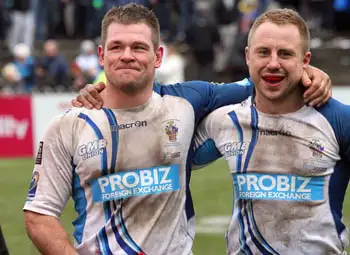Bring back promotion and relegation

Featherstone’s cup displays against Castleford and Wigan have re-ignited the promotion and relegation debate.
This is now the fifth season where there has been no automatic promotion and relegation between Super League and the Championship, after the RFL reverted to a licensing system designed to improve the all-round structure of each club.
While the Championship clubs have been largely ignored during this process, there is no doubting that Widnes were the right choice in terms of all the off-field boxes, but their on-field displays for the past few seasons have left a lot to be desired.
As Featherstone swept all before them to the Championship title last season, Widnes could only manage 5th, and haven’t appeared in a Grand Final since the last meaningful one back in 2007, when they were beaten by Castleford.
Instead of taking up a winning team, as Featherstone would have, Widnes took a handful of players from their Championship days, chucked in a few top level signings, and have conceded more than 560 points in just 12 games.
You could understand the process if there weren’t teams in Super League who didn’t tick the off-field boxes. Wakefield and Castleford still have the same tired grounds they promised to change back during the 2008 licensing process, while Bradford, Crusaders and Wakefield have all suffered great financial difficulties in the last 12 months alone.
That doesn’t take in to consideration the financial implications the lack of promotion and relegation has for teams outside the top flight. Difficulty to attract sponsors (what’s the point, you can’t go up), difficulty to attract fans (nothing really to aspire to) and difficulty to market their product (lack of resources).
All the licensing system appears to have done is increased the number of meaningless games in each league season. Widnes essentially wrote off their season after March 31st in 2011, and they’ve effectively written it off this season, with director of rugby Paul Cullen stating they are “seven years behind” everyone else (surely the point of the licensing system was to eradicate this?).
How does that motivate fans to go to the games? Bearing in mind, that ticket sales are one of the primary revenue streams for any club.
Compare their situation with say Wakefield in 2006, when the fans got behind their club in great numbers despite their struggles, and ultimately cheered the club to survival in that unforgettable derby match against Castleford.
Super League is becoming increasingly predictable. The top seven has virtually been decided already, and could have been predicted quite easily before the season started, and save for the four teams capable of competing for top 8, the others have nothing to play for, and will simply roll up (and often roll over) week in week out for the rest of the year.
It’s turning fans off. Even the successful teams are finding it hard to appease fans. I have spoken to a number of Warrington fans this season who have cancelled season tickets and decided to pick and choose their matches, because “beating Castleford, Bradford, Wakefield etc by 50+ is boring”. While they should be careful what they wish for (they could be like Widnes, and being on the wrong end of those scorelines each week), the sport needs to be careful that the on-field product isn’t diluted so detrimentally that it can no longer support off-field business models being put together.
The system allows clubs to become complacent. Widnes and London, for instance, can get away with putting out a below average product, knowing they will be in Super League next season. But it’s that sort of attitude that means they will struggle to attract new fans, and lose a portion of the fans they’ve already got.
There is no reason why, if a promotion and relegation structure was re-introduced, that there could not be some sort of due-diligence towards the promoted team. If their structures aren’t good enough, then don’t let them up, but at least give teams a chance to progress, and make the teams at the bottom of Super League work to retain their position.
“This is sport, not a Powerpoint display” (@tonehannan, April 2012)